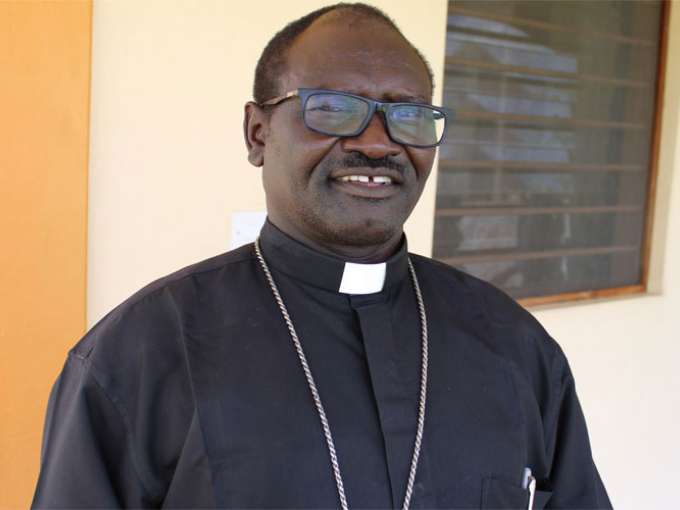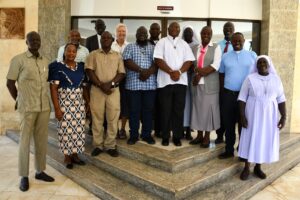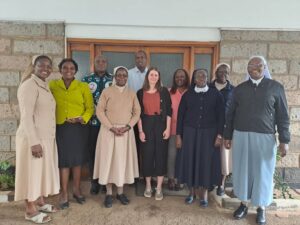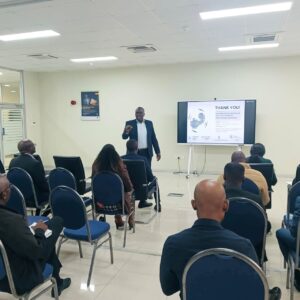SUDAN: Sudanese Prelate Warns against Political Threats over Nile Dam Dispute, Reiterates Pope’s Appeal for Dialogue

Bishop Yunan Tombe Trille Kuku of Ol Obeid diocese, Sudan
Sr. Jecinter Antoinette Okoth, FSSA
Days after Pope Francis’ call on the leadership of Ethiopia, Sudan and Egypt to dialogue concerning the Grand Ethiopian Renaissance Dam (GERD) controversy, Bishop Yunan Tombe Trille Kuku has echoed the Pontiff’s message, asking the three countries to negotiate about the dam project and keep off from politics that intensifies conflict.
“The call of the Holy Father Pope Francis for dialogue between Egypt, Ethiopia and Sudan on Saturday, August 15, urging them not to let the dispute over the dam lead to conflict was positively highlighted and taken up as a concern by some daily newspapers in the Khartoum Sudan,” Bishop Tombe said in a note sent to AMECEA Online on Thursday, August 27.
“I firmly believe that there is more diplomatic and political will for dialogue that will lead to some concrete solutions rather than resorting to war,” the Local Ordinary of El Obeid Diocese expressed adding, “The problem is wrapped up in political languages, which provoke tempers.”
The Prelate warns the leaders against political threats which affect dialogue saying, “Given that water is life, the issues should not be politicized. Political statements to win the ground may breed fears and weaken the potentials of genuine dialogue.”
According to Bishop Tombe who is also the President of Sudan Catholic Bishops’ Conference (SCBC), the inhabitants of the three nations along the banks of the Blue Nile have benefited from the river through “farming, fishing and transportation without major conflicts of interest.”
“Following the mass media and listening to the political statements of the leaders of three nations, all express their reasonable right to the utility of the waters of River Nile,” the Bishop said and continued, “both Egypt and Sudan maintain their sovereignty and secure socio-economic progress by building some dams in their territories. Ethiopia thinks on the same line as the Nile River is indeed within its sovereign territory too.”
Since the Nile River is of significance to the three countries, Bishop Tombe suggests that “Dialogue should take historical facts into considerations rather than viewing the matter through the needle of historic rights and veto.”
He explained, “The 1902 treaty between Britain and Ethiopia to which Britain claimed the control of the sources of Nile Rivers and who in turn signed a treaty of interest with Egypt in 1929, and in 1959 gave Egypt veto of controlling the waters. Logically, the environment, value of interests, population of citizens in all the three nations have altered and progressed since then.”
The Bishop disclosed that the dam controversy between Ethiopia and Egypt, is not at all a new issue.
“Egypt opposed the dam from the first day when the project was made public, on 31st March 2011, as some believed that the amount of water available from the Nile will minify. Then, fears erupted that this could restrict its already scarce supply of the Nile waters, which is almost the only water source for its citizens.”
Bishop Tombe has further appreciated Pope Francis’ concern saying, “The tone of the Pope’s invitation to all parties involved is that of encouraging the path of dialogue so that the eternal river will continue to be a source of life to all the countries involved and that it becomes a unifying factor rather than divisive element enmity, misunderstanding and conflict.”
“His paternal stand and concern is so impressive for us in Sudan and is viewed as a massive encouragement,” he concludes.


